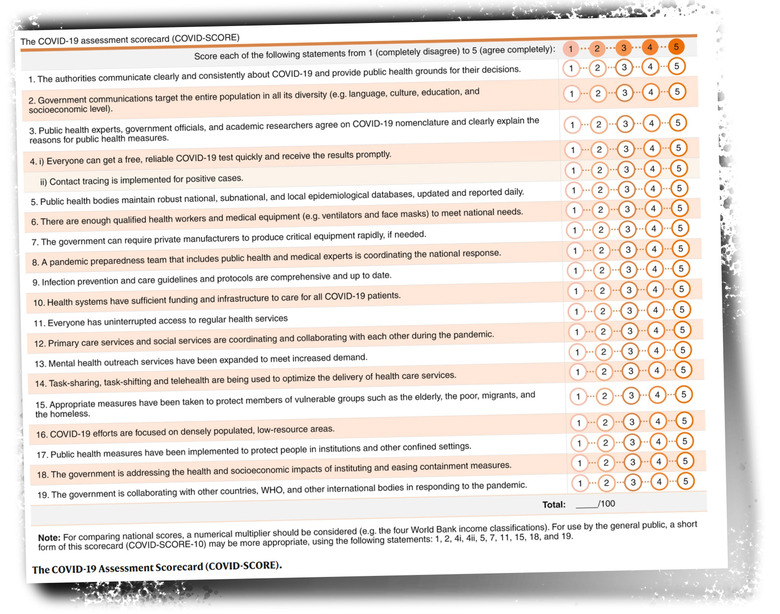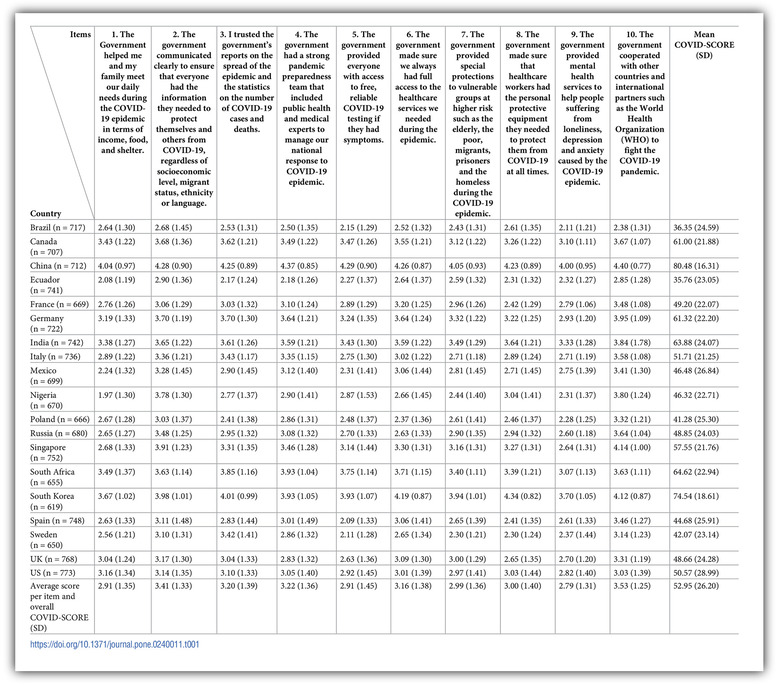COVID-SCORE study rates countries by COVID-19 response
A study published this week developed a global survey to show public perceptions of government responses to COVID-19. This study, conducted by researchers from the Barcelona Institute for Global Health (ISGlobal), Graduate School of Public Health & Health Policy, City University of New York (CUNY), and others worked with hundreds of citizens in countries around the world, assessing response in leadership to this unprecedented global pandemic. The United States didn't score the lowest on the list, but it most certainly did not score highest.
The study published in PLOS ONE shows how the COVID-SCORE tool was developed. This study also shows the results from the first major survey conducted with citizens of countries around the world (13,400 participants from 19 countries) in the month of June, 2020. The study utilized countries that were heavily affected by the pandemic, asking a pre-selected set of questions of hundreds of respondents, delivering some interesting results in the process.
Provision for mental health services was the lowest-rated item across all countries. This was one of a set of questions about assistance from the government in order to meet daily needs for income, shelter, and food. Governments around the world rated poorly in this area, along with the questions on protection and assistance for vulnerable groups.
Average Score by Country:
• China 80.48
• South Korea 74.54
• South Africa 64.62
• India 63.88
• Germany 61.32
• Canada 61.00
• Singapore 57.55
• Italy 51.71
• United States 50.57
• France 49.20
• Russia 48.85
• United Kingdom 48.66
• Mexico 46.48
• Nigeria 46.32
• Spain 44.68
• Sweden 42.07
• Poland 41.28
• Brazil 36.35
• Ecuador 35.76
(Maximum score 100)
The timing of this survey had a significant impact on responses. As the survey was taken in June, the United States had just delivered its one and only "emergency funds" check was sent to citizens. The highest-rated question for US-respondents was on the government's assistance with income, food, and shelter during the pandemic.
Per the research project Discussion: "Our goal was to provide governments with a survey instrument that they could use to support the upgrade of measures to improve public commitment to disease prevention and control, and to mitigate the social, health and economic impacts of COVID-19. To that end, we developed and applied a novel instrument, COVID-SCORE-10, to measure public perception of ten key responsibilities of government."

Above you'll see the proposed scorecard used for the survey as shown in a pre-survey study on the development of the tool COVID-SCORE. This and more information about the development of the tool can be found in Keeping governments accountable: the COVID-19 Assessment Scorecard (COVID-SCORE) as published in Nature Medicine in June of 2020 (This was BEFORE the results, earlier this year).
To learn more about the results of the study (as published TODAY), take a peek at the research paper COVID-SCORE: A global survey to assess public perceptions of government responses to COVID-19 (COVID-SCORE-10) as published with code DOI:10.1371/journal.pone.0240011 in PLOS ONE. October 2020. This paper was authored by Lazarus J, Ratzan S, Palayew A, Billari FC, Binagwaho A, Kimbali S, Larson HJ, Melegaro A, Rabin K, White TM, and El-Mohandes A..

UPDATE: Above are results from the first run of the COVID-SCORE survey. The full results can be found in the "COVID-SCORE" research link in the paragraph above.
